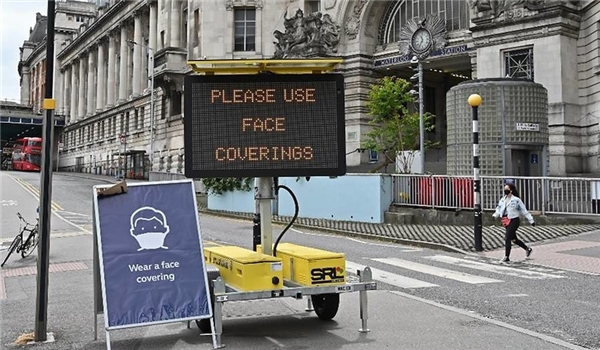
Britain’s economy shrank by a record 20.4% in April as the first full month of the coronavirus lockdown triggered an economic crash three times greater than the 2008 financial crisis.
Revealing the scale of the downturn, the official figures for gross domestic product (GDP) from the Office for National Statistics showed no area of the economy was left unscathed as the government imposed tight controls on business and social life to limit the spread of the disease, The Guardian reported.
The decline was the largest since comparable monthly records began in 1997 and was more than triple the previous record fall of 5.8% in March, when the lockdown was imposed late in the month.
The ONS said the monthly decline in April broke records across the board with all the main drivers of economic growth plunging into reverse, as people were told to stay at home to save lives, businesses were forced to close and millions of workers placed on furlough.
The country’s dominant services sector shrank by almost a fifth, fuelled by the closure of non-essential shops on the high street, pubs, restaurants and hotels, and evaporating car sales.
Air transport shrank by 92.8% in the biggest fall of any sector as flights were grounded across Britain and other countries. After the closure of hotels, pubs, bars and restaurants, the accommodation and food services sector shrank by 88% on the month.
Faced with disruption to international supply chains and the need to protect workers, shutdowns in production at many factories and reduced hours at others led manufacturing output to fall by a quarter.
The ONS said a 20.3% decline in production – which includes factory output as well as energy and mining – was more than double the collapse recorded during the miners’ strikes and Winter of Discontent of the 1970s, in the biggest slump since records began in 1968.
With cranes and diggers across the country falling idle as the virus spread, construction output plunged by 40%.
Jonathan Athow, deputy national statistician for economic statistics at the ONS, said, “April’s fall in GDP is the biggest the UK has ever seen, more than three times larger than last month and almost 10 times larger than the steepest pre-COVID-19 fall.”
Although some lockdown measures are now being eased as Boris Johnson’s government attempts to gradually reopen the economy, the snapshot from the ONS showed Britain’s economy at the onset of the deepest recession in living memory.
Over the wider three-month period to the end of April, GDP fell by 10.4%, as government restrictions on movement dramatically reduced economic activity. This was the sharpest decline on records dating back to 1955, in a collapse surpassing the industrial strife of the 1970s, recessions of the 80s and 90s, and the 2008 financial crisis.
Alongside the domestic hit to activity, the ONS said the UK’s trade with the rest of the world was also badly affected by the pandemic. There were large falls in the import and export of cars, fuels, works of art and clothing.
Rishi Sunak, the chancellor, said the government had protected millions of jobs through its emergency financial support schemes.
Saying that the hit to GDP was in line with downturns in other countries amid the global health emergency, he added, “We’ve set out our plan to gradually and safely reopen the economy. Next week, more shops on the high street will be able to open again as we start to get our lives a little bit more back to normal”.
This week the OECD said the UK economy would shrink by more than any other developed country as businesses struggled to recover from the pandemic. It predicted GDP would contract by 11.5% in 2020 or 14% if the virus returned and forced the government into a second lockdown.
The Bank of England has estimated GDP could contract by 25% in the second quarter and unemployment more than double, as the country plunges into the deepest recession for more than 300 years.
Economists said April should mark the nadir of the downturn as lockdown measures are gradually rolled back. They warned, however, that a fresh rise in COVID-19 infections could lead to the reimposition of tough controls and further economic damage.
Suren Thiru, head of economics at the British Chambers of Commerce, said any prospect of a rapid “V-shaped” recovery remained unlikely, with many sectors continuing to operate at reduced capacity.
“Some firms, including those in our hospitality, leisure and tourism industries, may remain closed for some time and will require flexible and open-ended government support to weather the economic storm,” he said.







